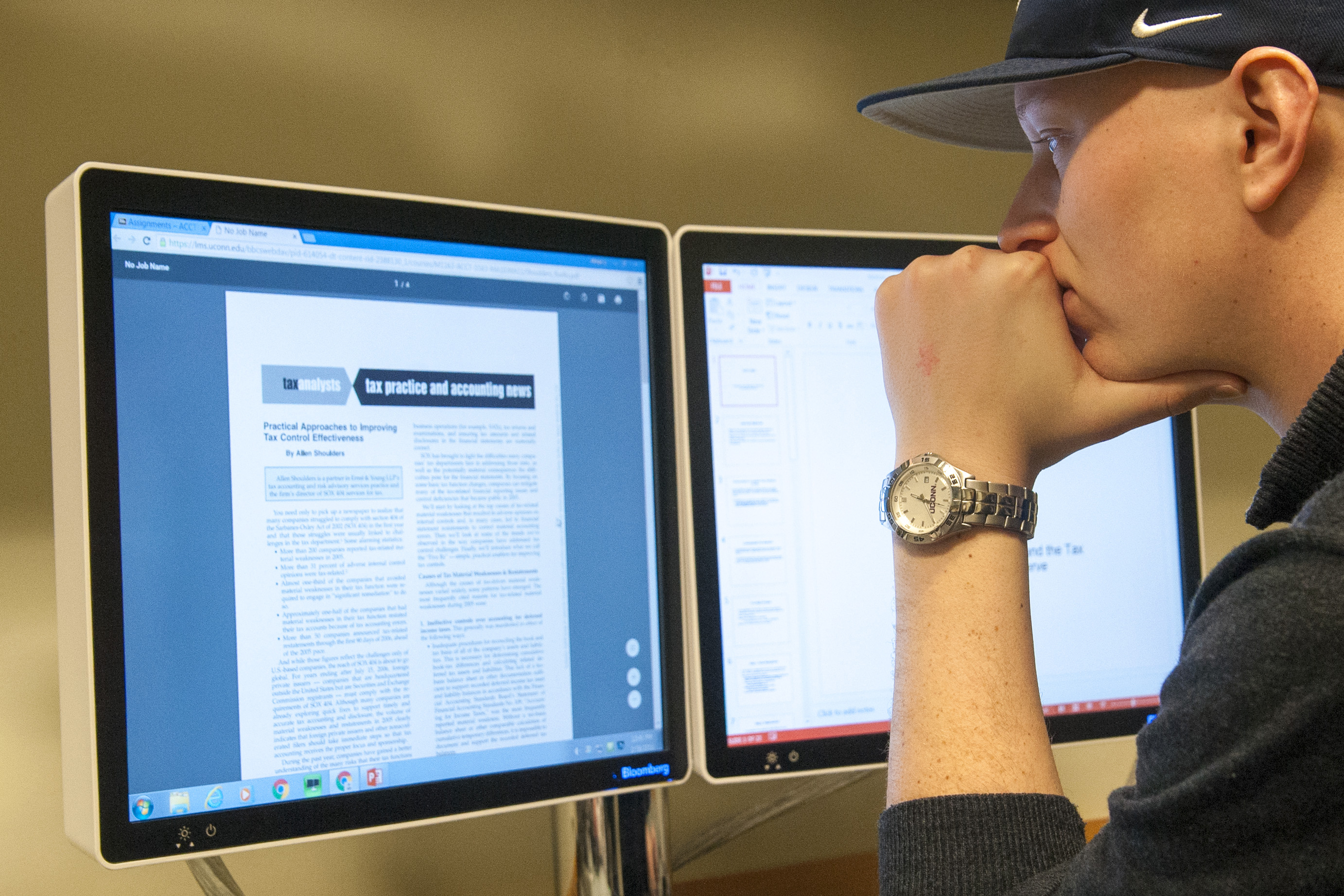UConn’s student-athletes are often lauded for their on-field or on-court achievements, but there’s an equally important – often unseen – dimension to the student-athlete. UConn Today is publishing a series of profiles to highlight the academic prowess of these student-athletes. Follow along as we profile two athletes each month, and provide an inside look at the academic pursuits of these high-achieving student-athletes.

Ryan Radue ’15 (BUS), ’17 MS
Hometown: Appleton, Wis.
Sport: Baseball
Major: Accounting
Anticipated graduation: Radue graduated in December 2015 from the School of Business, and is now working toward his MS in accounting, which he will receive in May 2017. Having sat out with an elbow injury in his freshman year, Radue has one further year of eligibility.
What position do you play? I’m a pitcher. During the game, the starting pitcher plays the first six or more innings. I try to keep the team up and encourage them, then around the fifth or sixth inning the relief pitcher will go down to the foul line and wait for the pitching coach to call in. When I’m on the mound, all eyes are on me and nothing can happen until I throw the ball, so I’m pretty much in control. If I mess up, everyone sees me mess up; but if I do well, everyone knows I did well. An important part of the game is how much the team behind me has my back when I’m on the mound.
What’s your favorite class, and why? Probably Advanced Accounting, because of who I took it with. My professor, Art Schmeiser, was awesome. I learned quite a bit about what I’ll be doing when I enter the work world and Professor Schmeiser went out of his way to help me get through a difficult class.
How do you balance the demands of your sport as well as a full class load? Time management: planning out what I have to do when, and how long it will take. The practice schedule is pretty much set every week, so I know how much time will need to be dedicated to baseball. Then I figure out when I will have free time, and decide what I need to get done for school.
What does your schedule look like on a typical day during the season? Once we get further into the season, we’re playing five games a week, so we don’t have copious amounts of free time; we get used to doing work on planes and in hotels. During a typical day, I go to class in the morning, head to the field right after class for multiple hours, then I go home, have dinner, and then do my schoolwork, because it’s really the only free time we have.
What are some of your academic accomplishments? I’ve been on the Dean’s List for business twice and for engineering once. I graduated with a 3.672 GPA.
I understand you are a cancer survivor. How did health issues affect you as both a student and an athlete? It made studying and learning more difficult because of how difficult it was to focus and remember things when receiving chemo, and it brought baseball to a complete halt until I was finished with my chemo treatment. [Radue resumed practice in mid-February and hopes to pitch again by April.]
Describe someone you’ve met here who has already impacted your future. I definitely have to say Coach Penders; he really emphasizes being a student-athlete and in that order. He makes sure early on when we’re all freshman amateurs that yes, baseball is very important, but we’re also still students, so he really pushed the bounds in teaching us that we’re not normal students. We can’t just study and then go out and be social; we need to be smart [about how we use our time]. He helped us to look into the future, which is hard as an 18-year-old amateur.
What does it mean to you to be a Husky? Being a Husky means being a part of a culture and a family that is on the rise. I know in the past 20 years, UConn programs have skyrocketed and are still getting even better. It’s the tight-knit family that I’ve made connections with that will last my entire life.
Where are you headed after you graduate with your master’s? After UConn, I’ll hopefully work for one of the big four accounting firms; I have an internship with one of them this summer, and hopefully that will turn into a job.
Radue will be a guest speaker at the 7th Annual White Coat Gala to benefit UConn Health on Saturday, April 16, at the Connecticut Convention Center in Hartford. He will speak about the quality of care he received as a lymphoma patient at the UConn Health Neag Comprehensive Cancer Center.



